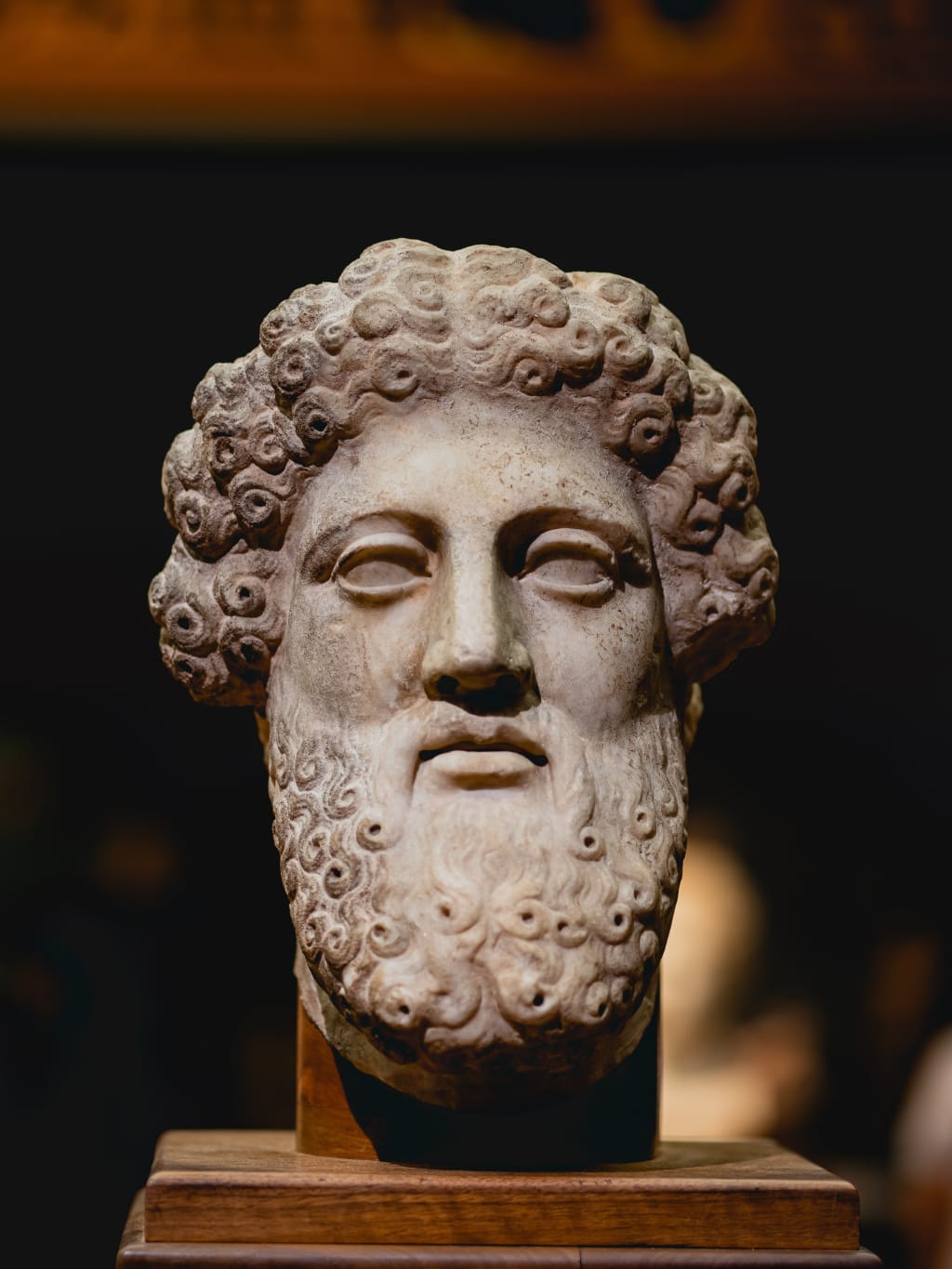A Comprehensive Guide to Lord Zeus and Their History!
How to Trace the Roots of Zeus

Lord Zeus, the iconic figure of ancient Greek mythology, is a symbol of power, authority and divine authority. Born to Cronus and Rhea, Zeus was part of the first generation of Olympian gods, and his ascension to the throne was an important moment in the history of mythology
Zeus's early life was fraught with danger, as his father Cronus, fearful of a prophecy that foretold his overthrow by one of his offspring, devoured his own children shortly after birth. However, Rhea, his mother, managed to save Zeus by tricking Cronus and presenting him with a stone wrapped in swaddling clothes, which he promptly swallowed, thinking it was his newborn son.
Raised in secrecy, Zeus grew into a powerful and cunning deity, destined to confront his father and free his siblings from their father's belly. With the help of Gaia, the Earth goddess, and Metis, the Titan of wisdom, Zeus concocted a plan to dethrone Cronus. He made Cronus drink a potion that caused him to regurgitate his swallowed children, including Hestia, Demeter, Hera, Hades, and Poseidon.
After their liberation, Zeus led his siblings in a fierce rebellion against the Titans, a race of powerful beings who ruled the cosmos. This epic struggle, known as the Titanomachy, lasted for ten long years. It was characterized by monumental battles and divine alliances as Zeus and his siblings fought valiantly against Cronus and the Titans. Ultimately, Zeus's cunning strategy and leadership prevailed, and the Titans were defeated, casting them into the depths of Tartarus, a dark and abyssal underworld.
With the Titans vanquished, Zeus and his siblings ascended to the throne of Mount Olympus, the highest peak in Greece and the dwelling place of the gods. Zeus, as the eldest, became the king of the gods, ruler of the heavens, and wielder of the thunderbolt. He was also the lord of the sky, the god of weather, and the protector of all living creatures.
Zeus's reign ushered in a new era known as the "Golden Age," characterized by prosperity, peace, and harmony. During this time, Zeus, with the assistance of his siblings, established order in the cosmos. He assigned dominions to each god, ensuring that they governed various aspects of the natural world, such as Poseidon's control over the seas and Demeter's influence over agriculture.
One of Zeus's most significant contributions to Greek mythology was the establishment of a set of laws and principles that governed the behavior of gods and mortals alike. These divine laws, known as "Themis," emphasized justice, fairness, and moral conduct. Zeus himself was often seen as the ultimate enforcer of these principles, ensuring that both gods and humans adhered to the laws of the cosmos.
Zeus's influence extended far beyond the boundaries of Olympus. He was considered the patron god of hospitality and guests, and breaking the laws of hospitality was seen as a grave offense in his eyes. This aspect of his character reinforced the importance of social order and respect for others in Greek society.
Zeus's love life was as complex as his rule. He was notorious for his numerous affairs with both goddesses and mortal women, resulting in a multitude of godly and heroic offspring. Perhaps his most famous love affair was with Hera, his sister and eventual queen of the gods. Despite their tumultuous relationship.
Zeus and Hera produced several notable children, including Ares, Hebe, and Hephaestus.
Artemis, goddess of the wild, hunting and vegetation.
Apollo, god of divine distance.
Hermes, god of business, wealth, luck, sleep and language.
Hebe, goddess of youth.
Eileithyia, goddess of fertility.
Hephaestus, the sacred artist, patron of craftsmen and god of fire. Heracles, guardian of Olympus and god of strength.
Athena, goddess of war. Ares, god of war and fighting.
Aphrodite, the goddess of love and beauty.
Helen of Troy, considered the most beautiful woman in the world.
Minos, king of Crete, owner of the Minotaur.
However, Zeus's extramarital escapades were equally legendary. His affairs included trysts with goddesses like Leto, who bore him Apollo and Artemis, and Europa, who gave birth to King Minos of Crete. One of the most famous stories involves his seduction of the beautiful mortal woman, Danaë, resulting in the birth of the hero Perseus. These love affairs were a testament to Zeus's insatiable desire and his ability to shape the destiny of both gods and mortals through his numerous offspring.
Zeus's power was not limited to his divine authority; he also possessed a formidable weapon, the thunderbolt. Crafted by the Cyclopes, he wielded this mighty weapon to cast lightning bolts, unleash storms, and demonstrate his dominance over the heavens and Earth. The thunderbolt became a symbol of his authority and was often depicted in art and literature as a representation of his divine might.
Despite his seemingly unassailable position, Zeus faced challenges to his rule. One of the most significant threats came from the Giants, monstrous beings born from the blood of Uranus, the primordial god of the sky. The Giants, led by their formidable leader, Alcyoneus, sought to overthrow the gods and claim dominion over the cosmos. This led to the Gigantomachy, a fierce battle between the gods and the Giants.
In the climactic battle, Zeus displayed his mastery over the thunderbolt, casting it with devastating force against the Giants. With the help of his divine allies, including Athena, Apollo, and Heracles, Zeus prevailed in this epic struggle, vanquishing the Giants and solidifying his supremacy.
Another notable challenge to Zeus's rule came from the Titan Prometheus. Prometheus, who had sided with Zeus during the Titanomachy, later incurred the god's wrath by stealing fire from Olympus and giving it to humanity. This act of defiance led to a clash between Zeus and Prometheus, during which the Titan was punished severely. Zeus bound Prometheus to a rock, where an eagle would daily feast upon his liver, which would miraculously regenerate, causing eternal torment.
Zeus's rule over the gods and mortals was marked by a balance between benevolence and stern justice. He was often depicted as a wise and just ruler who rewarded virtuous behavior and punished wrongdoing. His role as a dispenser of justice was exemplified by the story of Philemon and Baucis, an elderly couple who showed great hospitality to Zeus and Hermes when they visited Earth in disguise. In gratitude, Zeus spared them from a devastating flood that engulfed their region, transforming their home into a sacred temple.
Despite his power and authority, Zeus was not immune to the complexities of divine politics and familial strife. He frequently found himself entangled in conflicts and disputes among the gods, often acting as a mediator to restore harmony among his divine brethren. These conflicts revealed the intricate dynamics of Olympus, where jealousy, rivalry, and personal vendettas occasionally disrupted the tranquility of the divine realm.
Zeus's role as the lord of the sky and weather also made him responsible for maintaining the natural order. He was believed to control thunder, lightning, and rainfall, and his actions in this regard had a direct impact on the agricultural and meteorological cycles. Ancient Greeks prayed to Zeus for favorable weather conditions and protection from natural disasters, emphasizing his pivotal role in their daily lives.
Zeus's legacy extended well beyond ancient Greece. His image and attributes influenced the development of other cultures and religions, most notably the Roman god Jupiter (or Jove), who shared many similarities with Zeus. This syncretism between Greek and Roman mythology resulted in the fusion of their respective mythological traditions and a broader recognition of Zeus's influence.
In art and literature, Zeus was often depicted as a regal figure seated on a throne, adorned with a majestic beard and wielding the thunderbolt. His character served as a source of inspiration for countless works of classical literature, including Homer's epics, the "Iliad





Comments
There are no comments for this story
Be the first to respond and start the conversation.